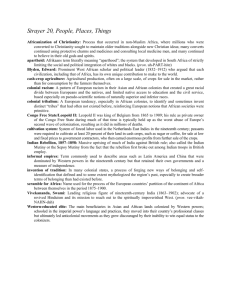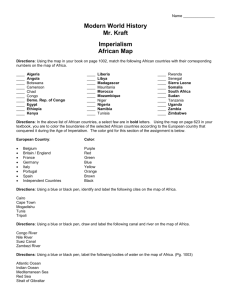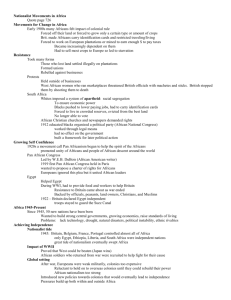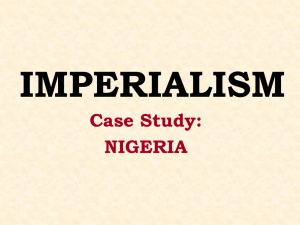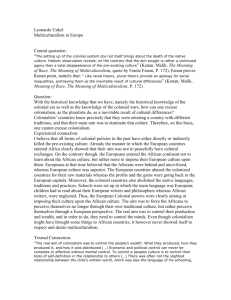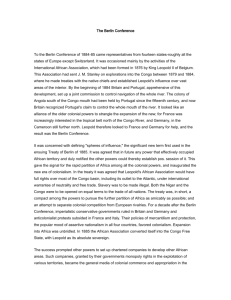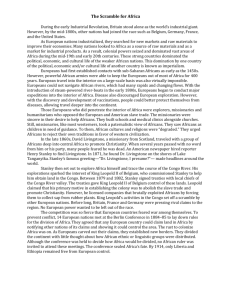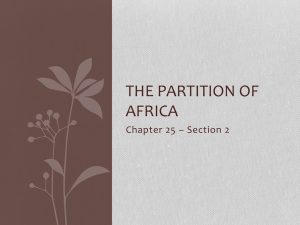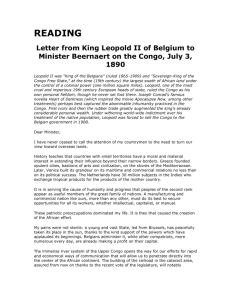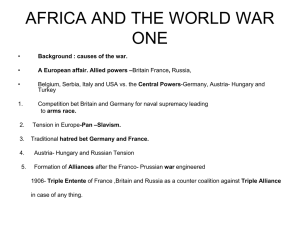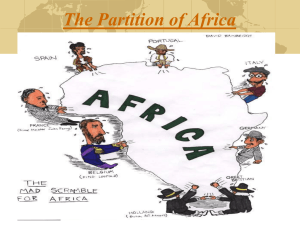Africa: State of Independence - Colonialism & Post-Independence
advertisement
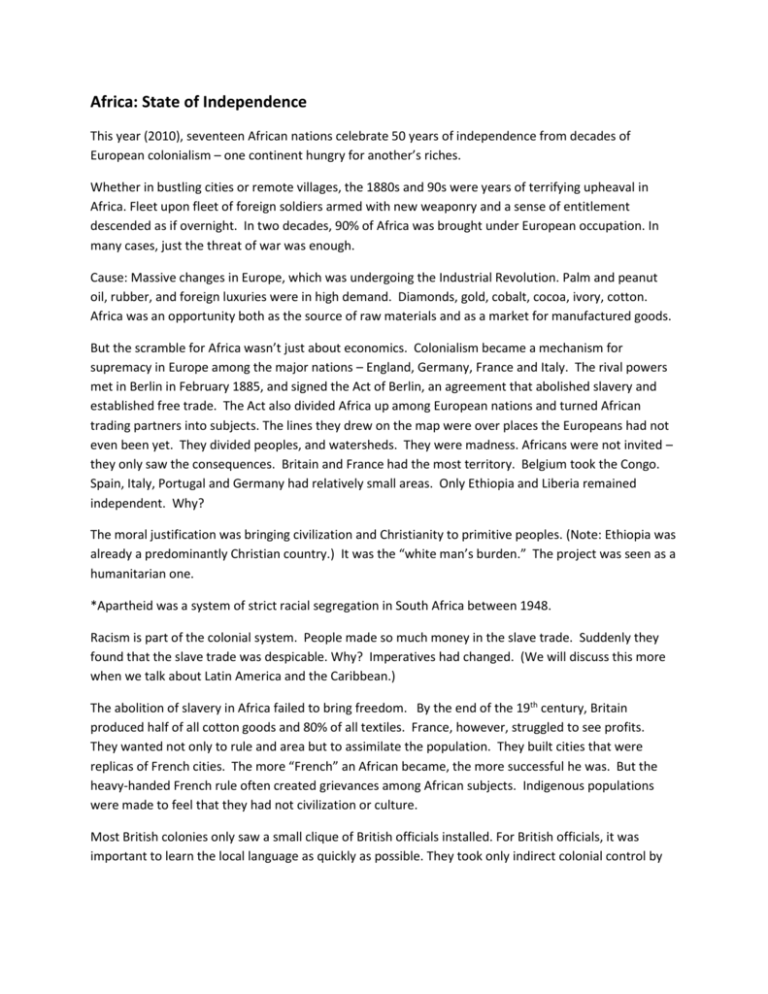
Africa: State of Independence This year (2010), seventeen African nations celebrate 50 years of independence from decades of European colonialism – one continent hungry for another’s riches. Whether in bustling cities or remote villages, the 1880s and 90s were years of terrifying upheaval in Africa. Fleet upon fleet of foreign soldiers armed with new weaponry and a sense of entitlement descended as if overnight. In two decades, 90% of Africa was brought under European occupation. In many cases, just the threat of war was enough. Cause: Massive changes in Europe, which was undergoing the Industrial Revolution. Palm and peanut oil, rubber, and foreign luxuries were in high demand. Diamonds, gold, cobalt, cocoa, ivory, cotton. Africa was an opportunity both as the source of raw materials and as a market for manufactured goods. But the scramble for Africa wasn’t just about economics. Colonialism became a mechanism for supremacy in Europe among the major nations – England, Germany, France and Italy. The rival powers met in Berlin in February 1885, and signed the Act of Berlin, an agreement that abolished slavery and established free trade. The Act also divided Africa up among European nations and turned African trading partners into subjects. The lines they drew on the map were over places the Europeans had not even been yet. They divided peoples, and watersheds. They were madness. Africans were not invited – they only saw the consequences. Britain and France had the most territory. Belgium took the Congo. Spain, Italy, Portugal and Germany had relatively small areas. Only Ethiopia and Liberia remained independent. Why? The moral justification was bringing civilization and Christianity to primitive peoples. (Note: Ethiopia was already a predominantly Christian country.) It was the “white man’s burden.” The project was seen as a humanitarian one. *Apartheid was a system of strict racial segregation in South Africa between 1948. Racism is part of the colonial system. People made so much money in the slave trade. Suddenly they found that the slave trade was despicable. Why? Imperatives had changed. (We will discuss this more when we talk about Latin America and the Caribbean.) The abolition of slavery in Africa failed to bring freedom. By the end of the 19th century, Britain produced half of all cotton goods and 80% of all textiles. France, however, struggled to see profits. They wanted not only to rule and area but to assimilate the population. They built cities that were replicas of French cities. The more “French” an African became, the more successful he was. But the heavy-handed French rule often created grievances among African subjects. Indigenous populations were made to feel that they had not civilization or culture. Most British colonies only saw a small clique of British officials installed. For British officials, it was important to learn the local language as quickly as possible. They took only indirect colonial control by appointing local leaders to manage the colonial mission. Ruling by proxy created its own problems, provoking enmity among various tribes and draining credibility away from appointed rulers. King Leopold II of Belgium walked away from the Berlin Conference with his own private colony (Congo Free State) and showed the effects of colonialism at its worst. He ruled for 23 horrific years during which the population of the Congo Free State halved and Leopold and his men gained huge personal fortunes. Dunlop invented the pneumatic tire, which increased the value of rubber. Leopold forced men, women and children to produce a quota of rubber. Those viewed as malingerers would have their hands chopped off – or worse. Africans who didn’t allow themselves to be enslaved were just killed. The Belgian government finally took the colony away from Leopold – years after his barbarism was exposed. Even in the best managed areas, Africans lost a huge degree of personal freedom. The infrastructure travelled from mines and plantations to the port. They did not connect cities. In Africa, it was ONLY about getting resources out. During WWI, at least 165,000 Africans are thought to have died. A half million died in WW2. After WW2, the French began to introduce the idea of the extension of citizenship to all people. Africans were appointed to assemblies in their respective colonies. But war released African independence movements because WW2 destroyed the idea of the invincibility of Europeans. Europeans were just like anyone else. Veterans came back to Africa highly politicized. The United Nations charter of 1945 explicitly promised self-sovereignty with a committee chartered to hear grievances from colonized areas. The 1930s were years of economic depression in Europe. The running cost of colonial administrations soared. At the same time, shrinking demand resulted in the fall in prices for raw materials. After WW2, Britain was bankrupt and couldn’t afford its colonies any more. Even as late as the 1950s, many people in Europe thought their empires would endure. By the 1950s, colonialism had produced an elite of African nationalist intellectuals. Behind them was a large, educated urban working classes. Together, they witnessed the power of nationalism in Egypt, which ejected Britain, and in Algeria, which fought a desperate war for independence from France. At the same time, the United Nations, the rise of the Civil Rights movement in the United States, and the anti-aparthheid movement, focused attention on black rights and spurred African movements for selfsovereignty. In 1957, Ghana became the first SSA state to gain independence. Kwame Nkrumah of Ghana became the father of African Nationalism. Nkrumah called for a United States of Africa on the American model. European governments had little choice about working with the nationalists. The pressure for wholesale decolonization had built steadily in the post-WW2 period. The tipping point occurred on February 3, 1960. British PM Harold McMillan delivered a warning shot to the whites of apartheid South Africa and a death blow to the colonial venture across the continent. Within 10 months, Britain surrendered two key territories and France surrendered 14. Many were freed without bloodshed. A new battle for the continent was underway: The Cold War. Back when the colonial idea had European’s politicians spellbound, the Soviet Union opposed it. African nationalists found a powerful friend in the Soviet Union. In the 1950s, the United States and the Soviet Union began to carve up the world between them. Both tried to organize coups to establish leaders that favored them. This was terribly destabilizing. In the Congo, Lamumba was labeled a Communist by the U.S. In 1960, he oversaw the handover of sovereignty from Belgium to an independent Congo. Militia leaders in the resource-rich Katanga province refused to yield power to a communist and declared independence. The U.S. and Belgium supported the rebels. The Katanga militiamen arrested, tortured and assassinated him within three weeks. This incident raised the question of whether national unity was possible. All kinds of political problems emerged which tore countries to pieces. But most countries couldn’t get independence fast enough. The 1960s were a very violent decade. Militaries began to seize power. Within the first 20 years of independence, there were 40 successful coups and many more unsuccessful ones. Territories were torn apart by ethnic conflict. Politicians looked to their own people as their political power base and politics became highly ethnicized. Two million people are thought to have died in ethnic violence in the 30 years following independence in former British colonies alone. In Nigeria, there was an imbalance between the Muslim North and the Christian South. In the south, there were more roads and schools. In the north, the local leaders had not allowed schools to be built. Civil war resulted. France redefined its relationship with its colonies to become the unseen hand in national affairs. The French never really left after independence. In 2006, President Nicolas Sarkozy promised real independence from France. But in 2010, France remained as closely interested in Africa’s affairs as they ever were. Domination of resources continues to be the cause of violence in many states. In the former Belgian Congo (now DRC) is locked in seemingly endless conflict over its mines. This conflict continues to impoverish countries. Rulers of African countries have deals with western companies. Today, Africa is the largest recipient of external foreign aid in the world. Half the population surives on less than $1 per day. But for every dollar that comes in, $10 are lost through illegal capital heading out. Over $437 billion has left Africa between 2000 and 2008 illegally. Much of that has flowed into tax havens owned by European countries – British in particular. So the ordinary people of Africa have not profited from what has been a very “good” decade for Africa economically. Since 1970, $854 billion has been lost, enough to wipe out all of Africa’s external debt and left $600 billion more for development. Most of the money can be traced back to the same countries who are now proudly bestowing aid on Africa. China is entering the scene once occupied by Europe. China’s demand for African resources has boosted prices, which has been good for Africa. This is the moment to build the infrastructure, educate the population, and bring health, it is not clear this is being done. Africa does have success stories. In Botswana, diamond exports have subsidized development under a multi-party government. In Senegal, democracy and stability have characterized the last 50 years of self-rule.
